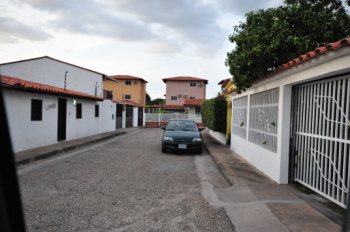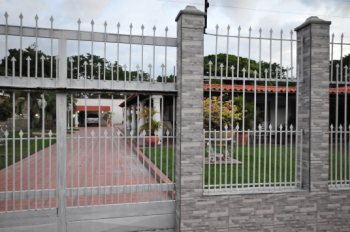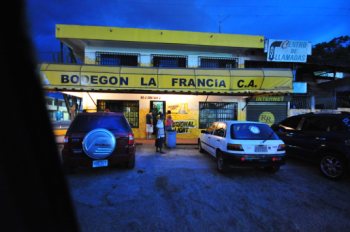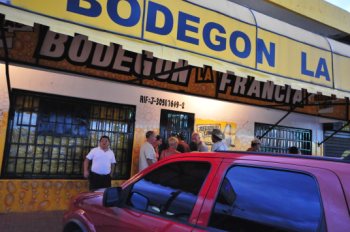|
Onward to Ciudad
Bolivar
 
Ciudad Bolívar is the capital
of Venezuela's south eastern Bolivar State. Angostura in 1764, renamed in 1846, and, as of 2005, had an
estimated population of 338,250. Carlos dropped us safely in his home town at 8pm to the Hotel Da
Gino. We stayed here on the night of the 8th and again on the 12th of October.
The first night eating in the hotel restaurant. Very good pizza. Our room was
large, en suite, clean and safe, our fitted bedside tables
were at a bit of a jaunty angle but for $20 per night was very
comfortable. Casino next door. Our return was on a public holiday so we went to
the casino restaurant and shared a very good carbonara and pizza. Pat and I
tried our hand at the machines, took me all my time to work out what to press -
but - a cheap night out, I put a twenty Bolivar note in, played for twenty
minutes and went home with the same. The 9th saw up leap up excited to be flying
up to Cainama. The 13th saw us climb aboard with Carlos for the bus journey back
to Guiria.

The Angostura Bridge - the most famous
landmark in Ciudad Bolivar
The Orinoco River, together with the Angostura
Bridge (which links up this state with the rest of the country) and its islands
offer one of Ciudad Bolívar’s loveliest views. The town lies at a narrowing of the Orinoco
River and the original name was a contraction of the town's full
descriptive name, 'Santo Tomé de Guayana de Angostura del Orinoco', "Saint
Thomas of Guayana of the narrows of the Orinoco." The city
lies at a spot where the Orinoco narrows to about one mile in width, and is
the site of the first bridge across the river.

Bear standing with
a bridge behind him and Beds that has recently been constructed downstream
at Puerto Ordaz- nicknamed Chevas Bridge, took four
years to build. Ciudad Bolivar's historic centre is in a good state of
preservation, with original colonial buildings around the Plaza Bolivar,
including the cathedral of Our Lady of the Snows.
  
The city seen from the six seater on our return from
Cainama.
Ciudad Bolivar today serves as an important port on the Orinoco
River for the eastern regions of Venezuela. One of the Orinoco Basin's
chief commercial centres, its main products include gold, iron ore, cattle,
hides and rare woods. The town also gave its name to the Angostura tree
(Cusparia Febrifuga) which grows in the area. The bark of the
small shrub-like tree was traditionally used as a bitter tonic and fever
reducer. Angostura bitters were invented here, though the unique
company has since moved to Trinidad and Tobago. In 1973 a Museum of Modern Art opened. It was designed by Carlos Raul Villanueva and was named after the city's famous son, the kinetic sculptor
Jesus Rafael Soto.
  
Our tour of the city on
the 12th showed typical scenes. The house in the middle was
for sale at one hundred thousand US, as soon as the driver (not Carlos)
thought we may be interested the price doubled.
The state capital was founded in 1764 under the name of Santo
Tome de Guayana de Angostura del Orinoco and known simply as Angostura. For
years, the city served as the base for Liberator Simon Bolivar’s military
operations, leading to the final stage of the War for Independence. In fact, in
1846, Angostura changed its name to that of Ciudad Bolivar, in honour of the
Liberator. The Congress of Angostura held in that city approved the creation of
Gran Colombia, a new republic that was to be comprised of Venezuela, Colombia
and Ecuador. The historical city centre, now duly restored and maintained, today
shows signs of the historic deeds of the War for Independence.
This is the first city we have ever visited that had
electrified razor wire, gated drives that led to
inner gated areas in front of the "posher" houses. On our return to the city we
stopped to get some beer, wine and rum at a shop that you bought through a small window. Ciudad Bolivar is located 591 km from Caracas, 296 km from Barcelona
(not the one in Spain), 1126 km from Maracaibo, 804 km from Barquisimeto and
1065 km from Mérida. It can be reached by road from El Tigre (Anzoategui State)
and Ciudad Guayana and planes fly in to the Ciudad Bolivar airport.

 
  
The Metropolitan
Cathedral of Ciudad Bolívar
Our Lady of the Snows, whose feast day is celebrated on August
the 5th every year, stands on the eastern side of the central square. Work was
started on the edifice in 1771 and its inauguration took place in
1840.
  
Bolivar Square
Located on Bolívar Square, in addition to
the Angostura Congress, are the salmon-colored Cathedral, the Piar House - where
Manuel Piar was imprisoned until shortly before his execution, the parish house
and the mansion inhabited by the colonial governors. The present headquarters of
the Bolívar State government are also situated on the square.
ALL IN ALL
GLAD WE SAW THIS CITY BUT FELT THE UNDERTOW OF BEING A
"GRINGO"
|






















